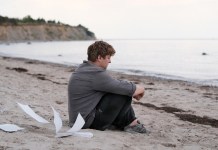

The opening voice-over tells of an alleged encounter Friedrich Nietzsche once had with a cabman engaged in beating his horse. Intervening, Nietzche returned home to his mother and sisters whereupon he entered a demented silence that was to last ten years until his eventual death. While no connection is explicitly made onscreen, it is probable that the film picks up the horse’s story, opening as it does with the horse and cart-driver returning home amid a heavy and unrelenting gale.
The plot – for want of a better word – follows Ohlsdorfer (Janos Derzsi), a bearded peasant who lives in a humble cottage with his hardy daughter (Erika Bok) and their afflicted horse. Charting their day-to-day hardships with excruciating detail, the audience watches as they stoically wake, dress, fetch water, load the cart, unload the cart, dine on boiled potatoes, stare out of the window and prepare for bed over a period of six uniform days.


Endeavouring to epitomise the heaviness of human existence, it is hard not to admire director Béla Tarr’s audaciousness in developing such a bare-bones and stripped-down narrative. Monochrome, comprised of as few as 30 (very) long shots and almost completely devoid of dialogue, The Turin Horse is as sombre as they come, the ambiguously apocalyptic overtones developing (preter)naturally from the Sisyphian grind. Utilising a steadycam to track the two actors as they inhabit – as opposed to act – their situation, cinematographer Fred Kelemen uses every inch of the purpose-built set in what amounts to an oppressively beautifully mise-en-scene – the superb framing in particular arresting the eye even when little else will.
Already the recipient of the Berlin Film Festival’s Silver Bear, The Turin Horse has been somewhat embraced by the festival circuit and has found a place in the hearts of Tarr’s extant fan base (this, after all, is alleged to constitute his directorial swansong) as one of the director’s most important works. Achieving its objective and crushing spirits with far more efficiency than life has ever achieved, The Turin Horse – which could just have easily been called The Millionth Potato or The Endless Gale for what little part the horse actually plays – is an unorthodox success. As a piece of entertainment, however, I think I’d rather have stuck with Nietzsche and his demented silence.
[Rating:3/5]






